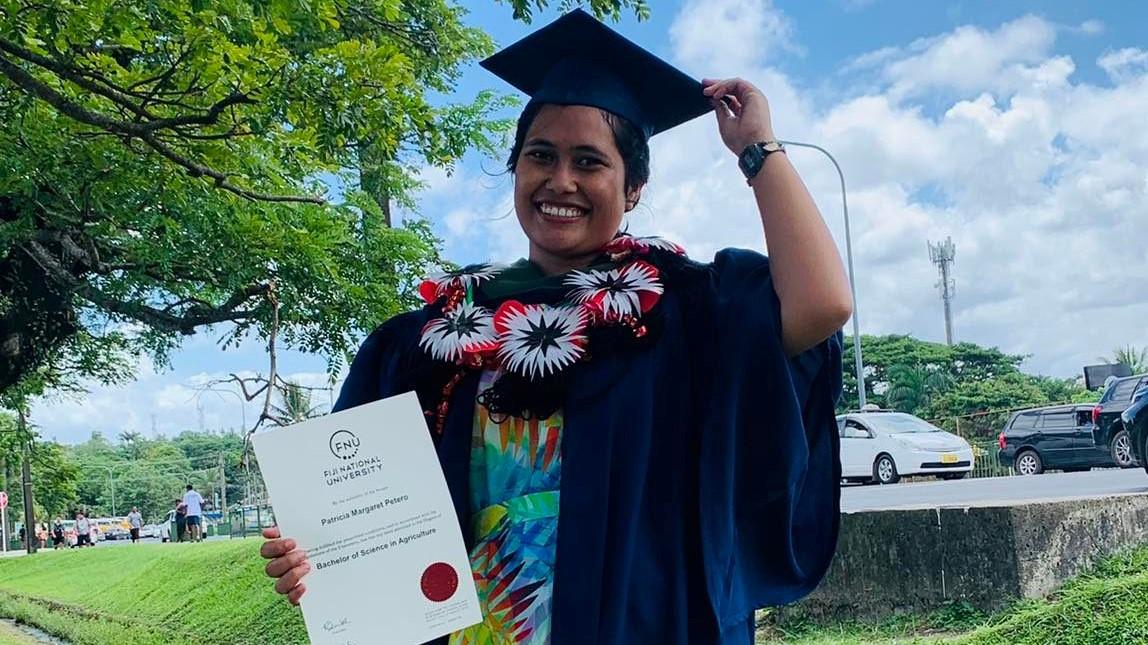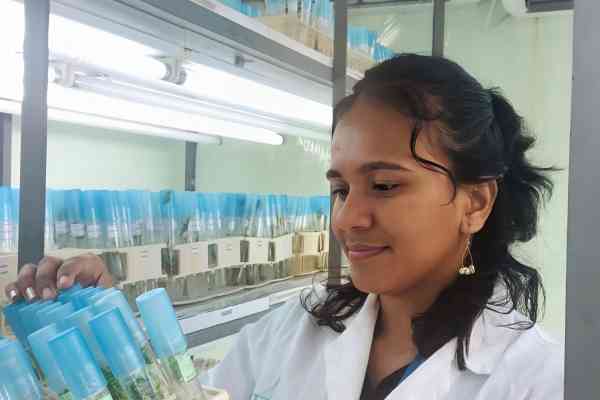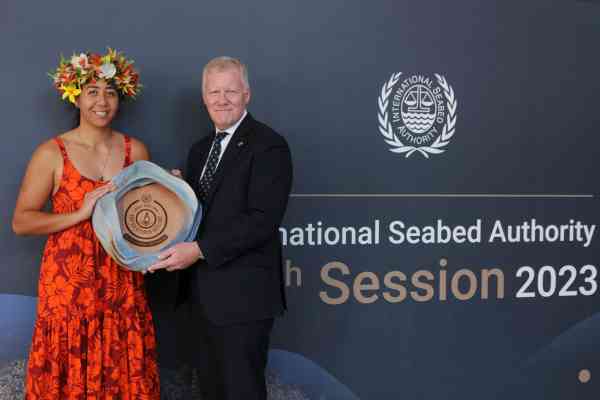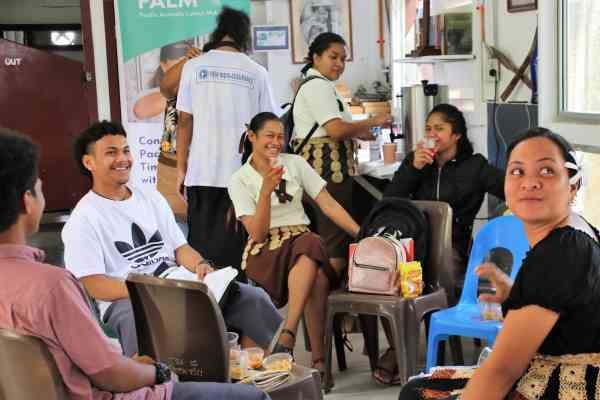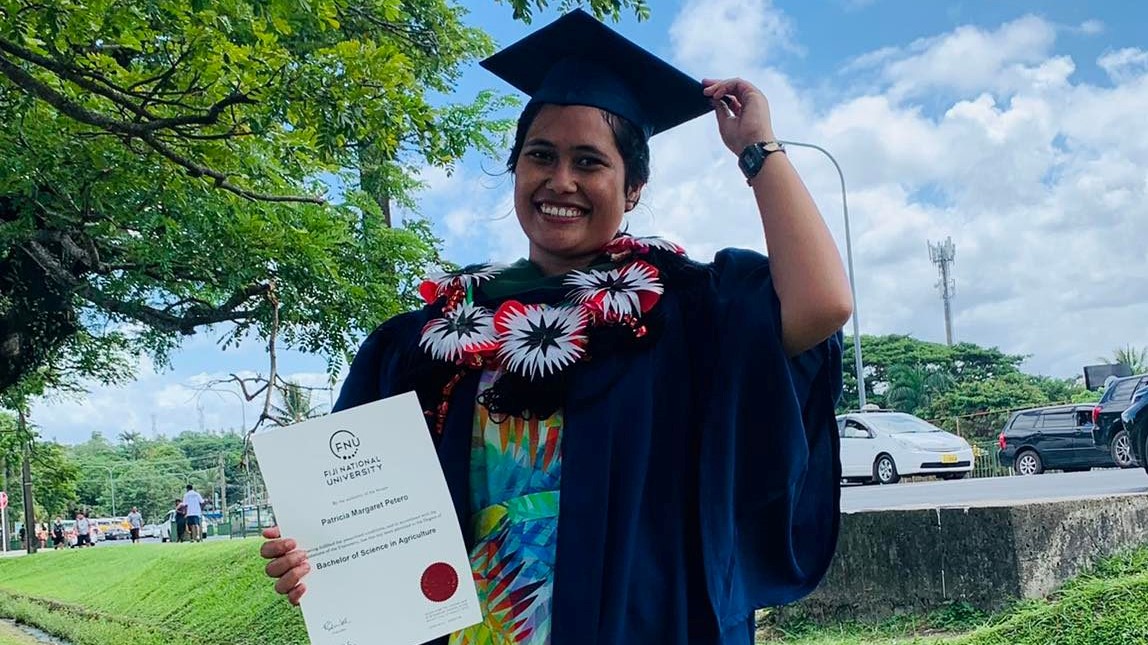 1. Could you briefly describe your academic or professional background and how it has led you to pursue this internship opportunity?
1. Could you briefly describe your academic or professional background and how it has led you to pursue this internship opportunity?
Agriculture has been a scoring subject since my secondary years, which I took to pursue as a career to expand my knowledge and learn new concepts. I graduated from the Fiji National University College of Agriculture, Fisheries and Forestry with a degree in Agriculture. I pursued an internship in advanced agriculture studies in Israel at the University of AICAT (Arava International Centre for Agricultural Training) from 2019-2021. Whilst studying, I worked on a big commercial farm planting various vegetables, harvesting and even packing them for marketing. Thanks to Dr Mereia Fong and Mr Fereti Atumurirava, Pest and Disease Manager at the Land Resources Division (LRD), I am lucky and happy to be elected to further pursue my career as an intern in the Land Resources Division under the Pesticide Unit here at the Pacific Community (SPC).
2. Can you tell me about your internship project? What inspired you to pursue it, and what are your main objectives or goals?
The project I am involved in is basically about promoting ecologically based alternatives to highly hazardous pesticides to enhance food safety and security in the Pacific Region. With this, we conduct lab and field evaluation trials for a potential list of candidates and select the best one that is ecologically friendly and at the same time eliminates pests and pathogens.
The inspiration behind pursuing this project stems from a deep concern for the environment and a genuine desire to address pressing issues related to food safety and security. Witnessing the adverse effects of highly hazardous pesticides on both the environment and human health has motivated the team to seek ecologically friendly alternatives that can mitigate these negative impacts. Additionally, observing the escalating challenges of pest and pathogen resistance to conventional pesticides has further highlighted the urgency to explore and promote sustainable solutions. This project’s ultimate inspiration lies in creating a positive impact on agricultural practices, fostering healthier ecosystems, and contributing to the well-being of local communities.
3. What specific challenges or obstacles have you faced during your internship, and how have you overcome them?
As an intern working on a project promoting ecological-based alternatives to highly hazardous pesticides for enhancing food safety and security in the region, one of the challenges I encounter is my limited knowledge about pesticides. Growing up, I was only familiar with two specific pesticides, Paraquat and Gramoxone. To overcome this challenge, I took time to read the SPC LRD pesticide manual, do a little research and seek guidance from my knowledgeable colleagues. By immersing myself in these resources, I was able to gain a comprehensive understanding of pesticides, their various types, active ingredients, class, product name, etc. This learning journey not only enhances my expertise but also contributes to my personal and professional growth in the field of agriculture.
4. In what ways has your internship enhanced your personal and professional development?
For me personally, being part of a team who are professionals made me nervous at first as I was afraid of making mistakes. However, as the days went by, my colleagues helped me build that confidence and always learn from my mistakes. Having supportive mentors who consistently encourage and have that belief in my abilities has instilled confidence and self-assurance, allowing me to tackle challenges with a positive mindset and a willingness to take on new responsibilities. Every day at LRD Pillar 3 (Sustainable Agriculture) is a day of learning. I am glad to be working in a collaborative team that values knowledge sharing and experience exchange which is highly beneficial. Such an environment has allowed me to foster continuous learning, allowing me to observe and absorb valuable insights from my colleagues.
5. Are there any specific skills or knowledge areas that you have gained or improved upon?
Through this internship, I had a valuable opportunity to enhance my understanding and expertise in plant diseases and diagnostics. During my university journey, we had a Plant Health Clinic training, however, due to time constraints, we couldn’t cover as much as we wanted to. Thanks to the Plant Health Clinic training conducted at the Koronivia Research Station in Fiji, it provided a comprehensive learning platform to inquire deeper into this complex field. Diagnosing plants can be tricky as we not only deal with insect pests but also with pathogens and nutrient deficiencies. The significance of this training has allowed me to broaden my knowledge base and hone my diagnostic skills, enabling me to make more accurate assessments in plant health management.
6. Could you shed some light on the organisations or institutions that have played a part in supporting your journey?
The Fiji National University, College of Agriculture, Fisheries and Forestry - CAFF has played a pivotal role in my academic journey, providing unwavering support and guidance. A big thanks to all my lecturers at CAFF who have been instrumental in my growth and learning experience. During my internship in Israel, there came a time when we were on the edge of giving up and wanting to return to Fiji. Dr. Kali would schedule Zoom meetings with us, just to hear our complaints, and then encourage us not to give up. Step by step, we as a team were able to say, ‘” Yes, we did it!” Today, we live that testimony we had experienced thanks to our Almighty Father for the continuous strength and guidance.
7. Lastly, is there anything else you would like to add or any advice you would give to other students or aspiring researchers or interns who may be interested in similar areas of study?
To my fellow interns and students, I want to share a valuable piece of advice that has guided me throughout my learning journey and beyond to always work hard in pursuit of your dreams. During my time in Israel, our motto was, “To Expect the Unexpected”, recognising that life comes with its share of struggles. However, I firmly believe that no struggle exists without a solution. Embrace challenges as opportunities for growth and learning, and remember that dedication, perseverance and prayer can overcome any obstacle. Whether you are striving for success in your academic pursuits, internships, or career goals, never underestimate the power of hard work and determination. Your journey may not always be smooth, but stay committed to your aspirations, seek guidance from mentors and colleagues, always ask questions in situations you are not clear or familiar with and maintain a positive attitude. With resilience and a steadfast focus on your dreams, you will find your way to success. So, work hard, pray without ceasing, expect the unexpected, and remember that every struggle has a solution waiting to be discovered.
